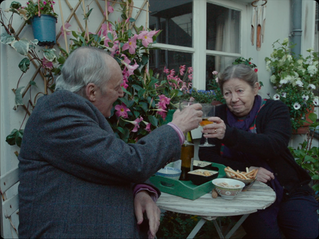Eyes Wide Shut
- Jessica Moore

- Sep 30, 2020
- 2 min read
Updated: Jan 30, 2022
Stanley Kubrick, 1999

Cerulean light spills into the decadent apartments that freckle the surface of Kubrick’s New York; conversations of aristocratic frivolity hum and drone in oppressive cycles; opulent clothing falls at the hips of cloned phantoms as they spin and slip beneath the veil. Kubrick’s fashionably underrated and ultimate feature ensnares its audience into the throes of a sexual odyssey, whispered through the incantations of postmodern erotica.
In Eyes Wide Shut, sex, marital or transactional, occurs beneath a sociological veneer. Whether it be the one-off encounter with Domino, the prostitute with masks on her walls; the underaged girl at Rainbow Costumes; or the women of the cult, the prostitutes of the film intimate adulterous sex as not simply unfaithful, this matters less, but potent enough as an idea to unravel years of carefully manicured devotion, rendering them toxic. For married father Bill Harford (Tom Cruise), the possibility of sex outside his marriage is confirmation of his financial status, attractiveness, and a salaciously literal vindication for his wife’s extra-marital sexual fantasies. Sex is, above all else, a method of control.
As a general practitioner, Bill runs the marital hazard of encountering, worse yet, examining other women, and the consequence is a jealous wife who at once yearned, and still yearns, to live sexually independent: to sleep with the naval officer who occupies her fantasies, or rather hundreds of men: anyone who isn’t Bill. This fantasy, or at least its pot-induced vocalisation, is in one sense a means to threaten and emasculate a man whose betrayal to his wife is certain. In another, the fantasy rather vehemently exposes the treachery of female sexuality. Alice Harford (Nicole Kidman) expressing sexual interest in anyone other than the father of her child is taken within the film as cruel at best, vampish at worst. And it is the immateriality of her claims that describes the film’s most applicable adage: it did not happen, but may as well have. Or, from the words of Bill, no dream is ever just a dream.
Made possible by their strange compatibility, their worlds begin to coalesce and interfere. Alice’s dreams conjure the details of Bill’s novel sexual encounters; their hungry desires fall into a proximate, lethal overlap. Unfaithfulness to each other, even broadly defined, did not strictly occur, though the damage is obvious. By the end of the film, aware of each other’s dissatisfaction and unknowability, Alice resolves: the important thing is we’re awake now and hopefully for a long time to come.
States of feeling, including dreams, alter the charade of reality in which we are most comfortable. They jolt us out of place; they strip the mask and leave us bare.









Comments